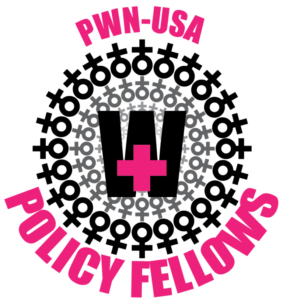
PWN’s Policy Fellowship is a year–long program designed to support women, transgender, and non-binary people living with HIV to gain skills in policy advocacy.
What we know:
- Black, Indigenous and People of Color (BIPOC) living with HIV and women, transgender, and gender non conforming people living with HIV have often not been included meaningfully at the tables where policy decisions are made.
- Our members are brilliant and have lived expertise that should guide policy advocacy strategies.
- Policies will have better outcomes for our communities when those who are most directly impacted by decisions are making those decisions.
PWN’s policy fellowship seeks to build the pipeline of well-informed and strategic policy advocates who come directly from the communities most impacted by the HIV epidemic in the United States: BIPOC women, trans, and non-binary folx living with HIV, through training, coaching, and real world practice in policy advocacy.
Our curriculum is grounded in gender and racial justice and focuses on increasing knowledge of how policy decisions are made, how we can impact them, and how to advocate for transformation to build the world we actually want to see – a world where all women, trans, and non-binary people living with HIV can live long, healthy and dignified lives free from stigma and discrimination.
Past fellows have led state-wide campaigns to modernize HIV criminalization laws, testified at Congressional briefings, organized advocacy days at their state capitol, created a rapid response team to mobilize the HIV community during the legislative session, and so much more. Every year, PWN Policy Fellows grow the number of women, trans, and non-binary people living with HIV who take the lead in local, state, and federal policy spaces. Is it your turn this year?
WHAT CONTENT WILL THE FELLOWSHIP COVER?
Over the course of the fellowship, participants will:
- Expand their understanding of the structure of government and how federal and state policy is developed, implemented and funded;
- Learn frameworks grounded in PWN’s values – racial, gender, and economic justice, liberation for our communities – to guide your advocacy (for example: racial justice and reproductive justice frameworks, trans liberation frameworks)
- Learn to analyze policy with a racial and gender justice lens;
- Deepen their understanding of strategies and tactics to effect policy change, including grassroots advocacy, effective coalition building,
- Learn to build and maintain relationships with policymakers and stakeholders who have influence over the policy-making process.
HOW IS THE FELLOWSHIP STRUCTURED?
The Fellowship period is May 2023 – June 2024. During this time, Fellows will participate in a series of interactive web-based sessions delivered by PWN staff and other policy, organizing, and advocacy experts. Fellows will also receive mentorship from past fellows who are now seasoned advocates in the field. Reading assignments and homework will be assigned between sessions. Where possible, we will pair fellows as partners to work on assignments and homework together.
WHAT DO FELLOWS GET FOR PARTICIPATING?
Fellows will have coaching and mentoring to support their policy advocacy goals, opportunities to attend policy meetings (virtually), opportunities to engage with state and/or national advocacy coalitions, and access to policy experts. Additionally, fellows will have the opportunity to obtain and apply marketable writing, research and organizing skills to support their professional development. Fellows who graduate successfully will receive a certificate of completion at the end of the program. Fellows will also receive $250.00/month during the program as long as they are meeting all program requirements.
ELIGIBILITY
The fellowship is open to all women, trans, and non-binary people living with HIV. We especially encourage applications from those who are: young, Black, Latinx, immigrant, queer, trans and gender-nonconforming, and/or low-income or working class. Folks can apply in pairs and we require that each person has access to a laptop, wifi, and can operate Zoom, email, Google docs, slides, and forms. All applicants should possess a strong desire to effect meaningful change in the lives of other women and TGNC people living with HIV to apply.
PROGRAM STRUCTURE
13 web-based policy skills-building training sessions (June 2023 2022-June 2023 2024 see tentative schedule below)
5-month practical application period, including the creation and execution of a policy project with a host organization, which may be completed with a Policy Fellow as your partner. Monthly coaching calls with mentors
TENTATIVE SCHEDULE
You must be able to participate in all aspects of the program to successfully complete the Policy Fellowship. Each web session is 1.5 hours long.
- Web Session 1 – Wednesday, May 24, 2023
- Fellowship Orientation
- Web Session 2 – June
- Technology 101 – Using Google Suite and Zoom
- Web Session 3 – June
- Understanding the structure of the federal and state government
- Web Session 4 – July
- Understanding administrative vs. legislative advocacy
- Web Session 5 – August
- Key Frameworks for Conducting Advocacy Part I – Racial Justice
- Web Session 6 – August
- Key Frameworks for Conducting Advocacy Part II – Gender Justice & Reproductive Justice
- Web Session 7 – September
- Abolitionist Frameworks
- Web Session 8 – October
- Meaningful Involvement of People Living with HIV/AIDS (MIPA) & Coalition 101
- Web Session 9 – November
- Understanding legislative session calendars, process, and timelines
- Web Session 10 – December
- Mid-year Review & Celebration
- Web Session 11 – January
- How to research targets and move a policy priority
- Web Session 12 – February
- Conducting effective meetings with decision makers
- Web Session 13 – March
- Storytelling for advocacy
- Web Session 14 – April
- Coalition teach back and preview/feedback on practicum
- Web Session 15 – May
- Legislative teach back and celebration
- Web Session 16 – June
- End-of-Year Presentation
- Practicum Period – January 2024 through May 2024
Questions?
For any questions about the application or the project, please contact PWN If/When/How Fellow, Maya Arigala (she/her), maya(at)pwn-usa.org.


